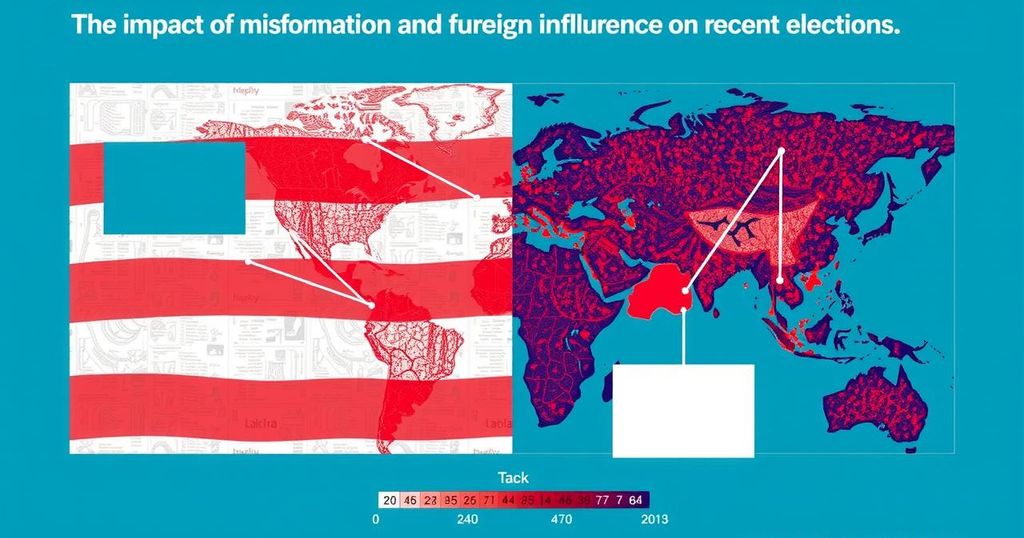The Impact of Misinformation and Foreign Influence in Global Elections of 2024

In 2024, approximately 3.7 billion people participated in global elections, a significant increase attributed to heightened awareness of misinformation and foreign influence. Despite projections of limited impact from generative AI and foreign interference, notable instances, including election annulments, underscored the ongoing threats to electoral integrity. High-profile cases in countries like Romania, Moldova, and the United States revealed vulnerabilities that necessitate greater vigilance in preserving democratic processes.
In 2024, a significant surge in global electoral participation occurred, described as a landmark ‘super year’ for elections. Approximately 3.7 billion individuals from over 70 countries were eligible to cast their votes, reflecting heightened democratic engagement amidst concerns over misinformation and foreign interference. High-stakes elections transpired in various nations, including the United States and India, along with authoritarian regimes in Belarus and Iran. Notably, the European elections in June witnessed over 182 million voters across 27 countries.
Despite optimism regarding the limited impact of misinformation, generative AI, and foreign influence on elections, there were instances that contradicted this narrative. Meta reported that the anticipated effects of generative AI on electoral processes were modest. Furthermore, studies by the UK-based Centre for Emerging Technology and Security suggested no substantial evidence that foreign-backed misinformation swayed election results in Europe or the U.S.
Nevertheless, the Romanian Constitutional Court’s annulment of the first-round presidential election results indicated that misinformation could significantly disrupt electoral integrity, as credible intelligence pointed to a ‘state actor’ behind the manipulation of social media discourse. Subsequently, Euronews highlighted five notable incidents that exposed the vulnerability of elections to AI-enabled misinformation and foreign interference throughout the year.
One instance involved former Pakistani Prime Minister Imran Khan, who utilized AI-generated technology to deliver speeches while imprisoned. Despite his disqualification from running due to legal issues, independent candidates associated with his party saw substantial electoral support. In the European parliamentary elections, disinformation posed a threat, albeit the voting proceeded without major disruptions.
Further complicating matters, corruption and foreign funding influenced Moldova’s pivotal referendum on EU membership, intensifying the struggle between pro-EU and pro-Russian narratives. The U.S. presidential election faced its own challenges, as online misinformation campaigns led to bomb threats disrupting polling stations in crucial battlegrounds. Finally, Romania’s election process was thrown into disarray when reports emerged of foreign interference aiding the rise of ultranationalist candidate Calin Georgescu, leading to the cancellation of the run-off despite his viral TikTok campaign. The situation prompted an investigation into the role of TikTok in electoral integrity.
As 2024 unfolded, it became clear that misinformation and foreign influence remained significant threats to electoral processes worldwide, revealing the need for greater vigilance and proactive measures against information manipulation in democratic practices.
The year 2024 is recognized for unprecedented electoral activity globally, often referred to as a ‘super year’ by experts. With an estimated 3.7 billion people eligible to vote across more than 70 nations, the elections encompassed influential democracies and authoritarian regimes alike. Concerns over misinformation, especially through generative AI and foreign interference, were prioritized as democracies aimed to safeguard electoral integrity. While preliminary analyses suggested little impact from such malpractices, subsequent events demonstrated that foreign and domestic actors could still disrupt elections significantly.
In conclusion, the events of 2024 underscore the persistent threats of misinformation, generative AI, and foreign interference in global elections. While many elections proceeded without major incidents, several notable disruptions illustrate the vulnerabilities within electoral systems. The necessity for robust measures to protect the integrity of democratic processes has become increasingly evident, signaling a continuing challenge for nations in maintaining transparent and fair elections.
Original Source: www.euronews.com






